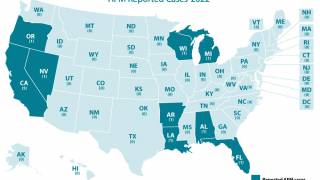New Acute Flaccid Myelitis Cases Confirmed During 2019

So far in 2019, there have been 2 confirmed cases of Acute Flaccid Myelitis (AFM) from North Carolina and Utah, according to the Centers for Disease Control and Prevention (CDC) report on March 4, 2019.
The 2 confirmed AFM cases are out of 15 reports of Patients Under Investigations (PUI) during 2019.
During 2018, there were 223 confirmed cases of AFM among the total of 374 PUIs reported by 41 states.
The leading states reporting confirmed AFM cases during 2018 were Texas (29), Colorado (16), California (14), Ohio (14), New Jersey (11). Washington (11), Pennsylvania (10), and Minnesota (10).
The CDC is not aware of any deaths in confirmed AFM cases with illness onsets in 2018 or 2019.
This 2018 year-end information compares with just 35 AFM cases from 16 states during 2017.
Previously, most patients had an onset of AFM between August and October, with increases in AFM cases every 2 years since 2014.
In the United Kingdom, Public Health England’s National Task Force is investigating the increase of Acute flaccid paralysis (AFP) reports, confirming 40 clinical cases as of January 21, 2019.
AFP is closely related to Acute Flaccid Myelitis.
AFM is a complex condition that is diagnosed by examining a patient’s nervous system in combination with reviewing pictures of the spinal cord, says the CDC.
Most of the AFM patients were children who had a mild respiratory illness or fever consistent with a viral infection before they developed AFM.
The CDC says ‘They don’t know why a small number of people develop AFM, while most others recover. We are continuing to investigate this.’
The CDC does say these AFM cases have tested negative for poliovirus.
The CDC has detected coxsackievirus A16, EV-A71, and EV-D68 in the spinal fluid of 4 of the 551 confirmed cases of AFM since 2014, which points to the cause of their AFM.
For all other patients, no pathogen has been detected in their spinal fluid to confirm a cause.
AFM symptoms are similar to other neurological diseases, such as Guillain-Barre syndrome (GBS), acute disseminated encephalomyelitis (ADEM), and transverse myelitis.
There is no specific treatment for AFM, but a doctor who specializes in treating brain and spinal cord illnesses may recommend certain interventions on a case-by-case basis.
Furthermore, the CDC published an updated “Interim Considerations for Clinical Management of Patients with AFM” in November 2018.
Our Trust Standards: Medical Advisory Committee
























